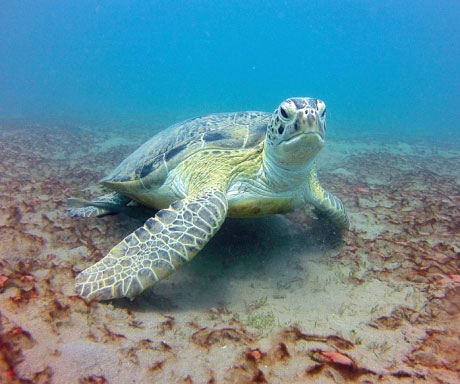What's Happening at Discovery Diving
Get all the latest info from our Instructors and Staff on our SCUBA Classes, Charters, Equipment and Special Events.
Shark loss hits global ecosystems
- Font size: Larger Smaller
- Hits: 1516
- 0 Comments
- Subscribe to this entry
- Bookmark
The loss of sharks could contribute to the destruction of one of the planet’s most under-appreciated sources of carbon storage — seagrasses, according to FIU researchers. Not that sharks eat the seagrass, they don’t, but they do eat the turtles which feed in the seagrass meadows. Add this to the problems of pollution, mooring and destruction of seagrass, means this vital habitat – and the sharks – need help.
“Seagrasses around the world are under considerable threat — from pollution to dredging and changes in water quality,†said Mike Heithaus, marine biology researcher who specialises in sharks. “Now, it appears that the loss of sharks, especially tiger sharks, can cause collapses of seagrass ecosystems as well.â€
As global efforts are under way to conserve turtles, shark populations are suffering from overfishing, which is creating an imbalance of the two animals in the world’s oceans. The focus of the research is about sustaining the delicate food chain balance. In this case, sharks, turtles and seagrasses must all be preserved in concert. To not do so, could trigger an ecosystem collapse.

Green Turtle (Chelonia mydas) in what was once a seagrass meadow
“Historical overfishing of sea turtles so drastically reduced the numbers of turtles in the ocean by the 16th century that impacts on seagrass meadows were rarely recognized,†said James Fourqurean, co-author of the study. “It’s only now that conservation efforts are on their way to restoring sea turtle populations that we are now experiencing the consequences of how overfishing large sharks is impacting seagrass.â€
The concept is simple. Sharks feed on turtles. Turtles eat seagrass. Healthy tiger shark populations keep turtle populations in check so they do not devour entire meadows before the seagrasses are able to replenish themselves. Seagrass meadows, acre per acre, are among the world’s most valuable ecosystems, providing nurseries for species that people rely on, protecting water quality and slowing rates of coastal erosion. Seagrass absorbs carbon dioxide and outputs oxygen at twice the daily rate of tropical forests, which helps to mitigate climate change. With seagrass meadows disappearing at an annual rate of about 1.5 per cent, 299 million tonnes of carbon are being released back into the environment each year, according to research published in Nature Geoscience (DOI: 10.1038/ngeo1477).
While most seagrass losses to date have been attributed to poor coastal zone management, the food chain variable has been largely ignored.
The researchers examined the impacts of green sea turtles on seagrass communities in Bermuda, Australia, Indonesia and India, all locations with large green sea turtle populations. The findings were published this week in Frontiers in Marine Science. In each of the sites, data suggests the seagrass meadows are being disrupted by heavy grazing where turtle populations are increasing and shark populations are down. But that doesn’t mean turtles are villains. In most of the world, they are threatened with extinction and still need conservation.
“We’ve seen similar issues on land – the loss of wolves leads to population explosions of deer that then damage ecosystems,†Heithaus said. “We need efforts to protect and rebuild turtle populations in most of the world, but we also need to be working to ensure that populations of their predators are intact so the turtles don’t eat themselves out of house and home.â€

